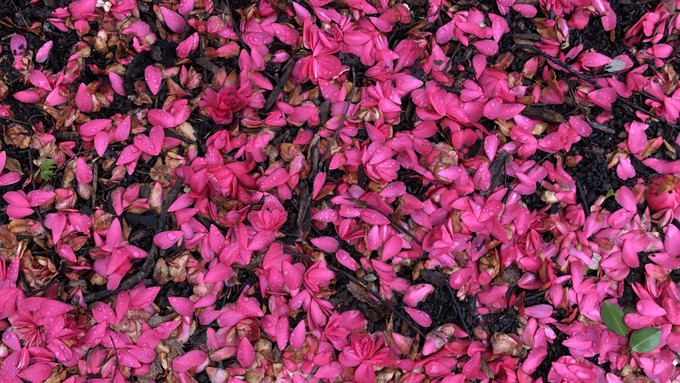
Sacramento gets soaked (again) as we ‘spring’ forward

Camellia petals on the ground -- and soggy, too! Yikes, gather those up to prevent the spread of blossom blight. Kathy Morrison
Keep your rain boots handy; our very wet March continues with storms in the forecast every day this week except Thursday.
Depending on where this latest atmospheric river flows, Sacramento could get another 2 inches – or double that amount. According to the National Weather Service, the forecast is quite literally fluid.
On Saturday morning, the weather service issued warnings for thunderstorms and funnel clouds into Saturday night. Sunday’s forecast calls for “definite rain showers and thunderstorms.” The chance of precipitation on Tuesday is 100%.
Meanwhile, our temperatures have drifted up to almost normal. Afternoon highs will still be on the cool side – right around 60 to 62 degrees – but overnight lows will be in the mid 40s to mid 50s, enough of an increase to start warming up the soil.
It’s also time to reset our clocks as we “spring” forward for Daylight Saving Time. Move your clocks ahead one hour before you go to bed Saturday night.
As a gardener, it’s time for patience. Although spring fever has definitely arrived, soil is going to be very wet after all this rain. Wait for water to drain before digging and planting. Walking on or working wet soil can compact it, turning clay particles into brick-like clods.
The good news: All this moisture should assure a big spring bloom – when our sunshine finally returns.
* Fertilize roses, annual flowers and berries as spring growth begins to appear.
* Pull weeds now! Don’t let them get started. Take a hoe and whack them as soon as they sprout.
* Once the rain stops, start preparing vegetable beds. Spade in compost and other amendments.
* Prune and fertilize spring-flowering shrubs after bloom.
* Feed camellias at the end of their bloom cycle. Pick up browned and fallen flowers to help corral blossom blight.
* Feed citrus trees when they start showing blooms.
* Cut back and fertilize perennial herbs to encourage new growth.
* Transplant lettuce, collards and kale.
* Seed chard and beets directly into the ground.
* This is your last chance to plant such cool-season annuals as pansies, violas and primroses.
* Plant summer bulbs, including gladiolus, tuberous begonias and callas. Also plant dahlia tubers.
* Shop for perennials. Many varieties are available in local nurseries and at plant events. They can be transplanted now while the weather remains relatively cool.
Comments
0 comments have been posted.Sacramento Digs Gardening to your inbox.
Sites We Like
Garden Checklist for week of July 21
Your garden needs you!
* Keep your vegetable garden watered, mulched and weeded. Water before 8 a.m. to reduce the chance of fungal infection and to conserve moisture.
* Feed vegetable plants bone meal, rock phosphate or other fertilizers high in phosphate to stimulate more blooms and fruiting. (But wait until daily high temperatures drop out of the 100s.)
* Don’t let tomatoes wilt or dry out completely. Give tomatoes a deep watering two to three times a week.
* Harvest vegetables promptly to encourage plants to produce more. Squash especially tends to grow rapidly in hot weather. Keep an eye on zucchini.
* Pinch back chrysanthemums for bushy plants and more flowers in September.
* Remove spent flowers from roses, daylilies and other bloomers as they finish flowering.
* Pinch off blooms from basil so the plant will grow more leaves.
* Cut back lavender after flowering to promote a second bloom.
* It's not too late to add a splash of color. Plant petunias, snapdragons, zinnias and marigolds.
* From seed, plant corn, pumpkins, radishes, winter squash and sunflowers.